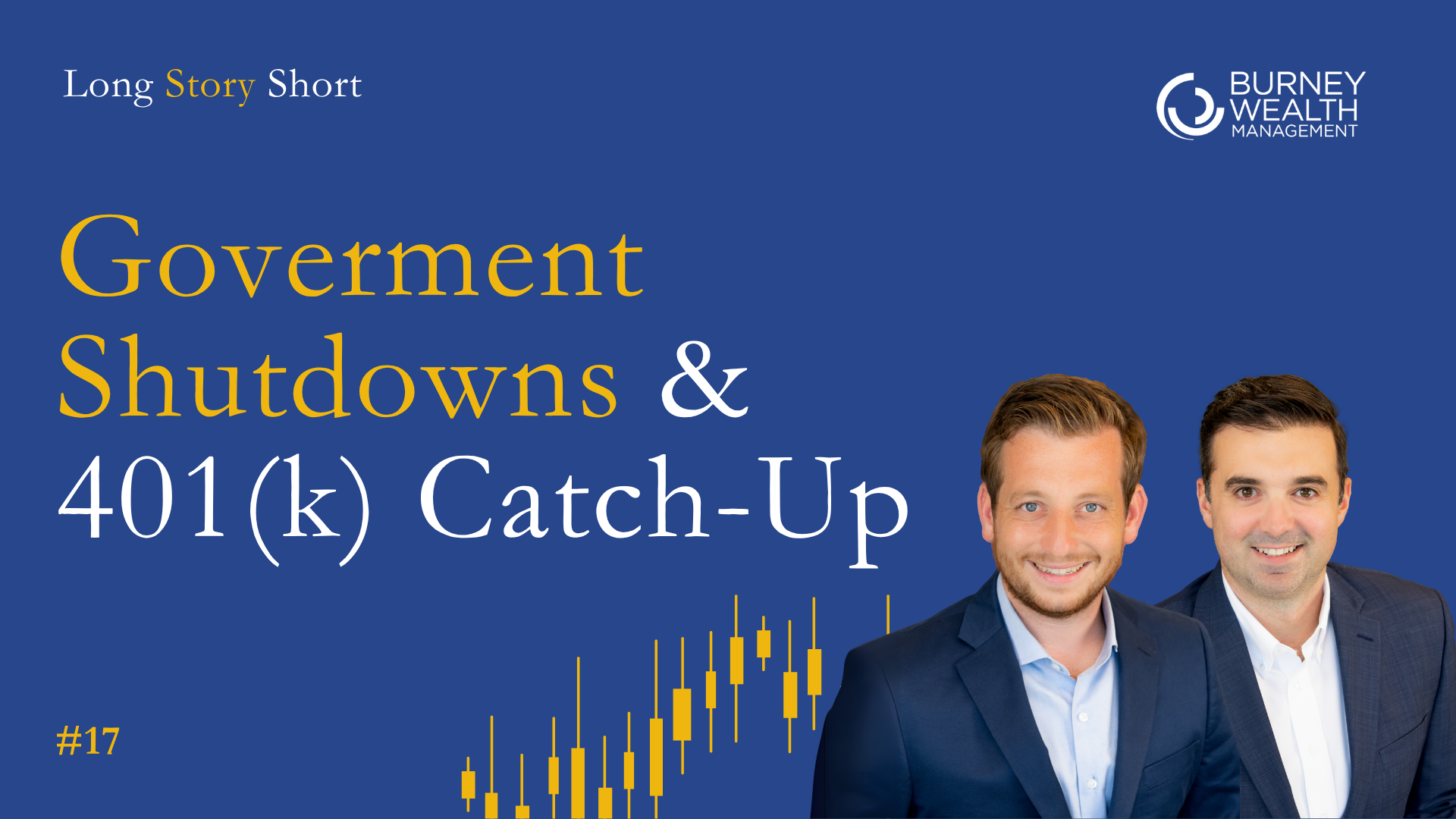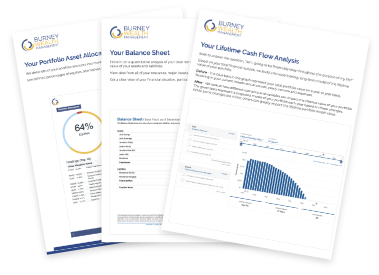Government Shutdowns, 401(k) Catch-Up Changes, and When Trusts Actually Make Sense | Ep 17

Watch or listen to the episode below:
Andy looks out his office window in Reston, Virginia and sees the DC Metro heading to Dulles Airport. When government shutdowns happen, it matters locally. Everyone either works for the government or contractors supporting the government. Nobody's working, which means his commute gets easier.
For the rest of the country? These shutdowns barely register.
Markets Have Seen This Movie Before
Adam pulled the data on government shutdowns since 1980. There have been ten of them, seven of which showed positive stock returns during the shutdown period. The worst decline was 2% in 1990.
The most recent one ran from December 2018 into January 2019, lasting 35 days. The S&P was up almost 10.25% during that stretch.
This doesn't mean shutdowns are good for markets, markets are just up most of the time. About 75% of years show positive returns regardless of what's happening in Washington.
The pattern suggests markets have learned to price in dysfunction as the new normal. Debt ceiling fights happen regularly and budget battles are scheduled chaos. None of it surprises anyone anymore.
Andy distinguishes between government shutdowns and debt ceiling crises. Shutdowns mean workers get furloughed but eventually get paid. Debt ceiling breaches would mean the US defaulting on obligations, which is theoretically catastrophic but also something that never actually happens.
Both are used as negotiating tactics. Both create headlines. Neither moves markets much because everyone knows how the story ends.
The 401(k) Change That Actually Matters
Starting January 1, 2026, if your prior year income exceeded $145,000, your catch-up contributions must now be made on a Roth account basis, rather than to your 401(k). No more deferring taxes on that extra $7,500 (or $11,250 if you're in the oddly specific 60-63 age bracket).
This gets complicated fast.
The current rules let anyone over 50 contribute an extra $7,500 beyond the standard $23,500 limit. If you're between 60 and 63, you get an additional boost to $34,750 total. At 64, you drop back down to the regular catch-up amount.
Those numbers will adjust for inflation each year, but the core change remains: high earners can't defer taxes on catch-up contributions anymore.
The $145,000 threshold applies whether you're single or married filing jointly, which penalizes married couples. It looks backward one year, so your 2026 catch-up eligibility depends on your 2025 income. And it's calculated per employer, so if you split $150,000 between two jobs, neither employment income crosses the threshold.
The administration of this will be messy. If your 401(k) provider doesn't offer Roth contributions, which many still don't, you can't make catch-up contributions at all. Smaller employers with smaller custodians will get hit hardest.
The Forced Roth Silver Lining
Andy's kids have learned to demand things by saying "it's my milk and I want it now." That's basically what the IRS is doing here.
The tax hit today stings. But those Roth dollars compounding at 7-10% for multiple decades could turn into something meaningful. Tax-free growth has real value, especially if tax rates rise in the future.
This creates forced tax diversification for people who might never choose it themselves. Most high earners naturally gravitate toward pre-tax contributions to reduce current tax bills. Now they'll build Roth balances whether they like it or not.
Adam frames this as potentially beneficial long-term despite the short-term pain. Having buckets of pre-tax money, taxable money, and Roth money gives flexibility in retirement that pure pre-tax savings can't match.
Nobody knows what tax rates will look like in 30 years. Building options now makes sense.
Trust Fundamentals Without the Jargon
Andy got stung by a bee on the head at the bus stop. Kids were provoking the bees, he caught the consequences. The experience got him thinking about when life events happen unexpectedly, which led to asking Adam about trusts.
Trusts are the ultimate flexibility tool in estate planning. They come in unlimited variations, which is why blanket statements about needing or not needing them are useless.
A primary decision is whether to make the trust revocable or irrevocable.
Revocable trusts let you maintain control. You can change terms, access money, revoke the whole thing if you want. The money is still yours for tax purposes. These are common for people wanting more control over asset distribution without estate tax concerns.
Creating an irrevocable trust generally means that you cannot access the funds used to fund the trust. You have given the money away and can't touch it. In short, it's not yours anymore for tax purposes. These trusts are mainly used by people with estate tax issues who need to move assets out of their taxable estate.
Most clients use revocable trusts because they want control over the trust assets while alive, but implement detailed instructions for those assets after death. A joint brokerage account with transfer-on-death beneficiaries stops at one generation. When the second spouse dies, beneficiaries get the money and do whatever they want with it.
Trusts let you dictate what happens two, three, even four generations out. You can specify when kids get money, how much, under what conditions. You can protect assets from divorcing spouses or creditors. You can create incentives or restrictions.
The Probate Problem Nobody Mentions
Adam emphasizes probate avoidance as a massive benefit most people overlook.
Generally, any asset without a direct beneficiary designation or trust ownership goes through some sort of probate process when you die. In some cases, courts will decide how assets are distributed. The filing of a will requires public notice. Family members who hate each other can contest it legally. Probate can take months or years to finalize and cost serious money.
Trusts bypass all of that. Beneficiary designations on retirement accounts and life insurance also avoid probate. But taxable brokerage accounts often lack proper beneficiary designations, which creates problems.
The public service announcement: check every taxable account for beneficiary designations today. If they're not there, add them. This single step prevents enormous headaches.
Trusts add another layer of protection and control on top of beneficiary designations.
Wills and Trusts Work Together
People think wills or trust are an either/or proposition from an estate planning perspective. You can either have a will or trust, but not both. That's wrong. You can have both as part of a plan.
Wills and trusts complement each other. Among other things, wills handle distribution of funds and personal property. They represent a snapshot of time (at your death) saying "here's what I own and who should get it."
Trusts remain in effect after your death. They provide post mortem instructions that could span decades. Adam refers to wills as a balance sheet and trusts as a cash flow statement looking into the future.
For simple situations: married couple with kids who just want their estate assets to pass to the surviving spouse and then split among their children, good beneficiary designations and a solid will probably suffice.
Trusts become valuable when you want specifics beyond that first generation. When you want money distributed at certain ages. When family dynamics are complicated. When you want control beyond "spouse gets it, then kids split it equally."
Nothing Is Black and White
Andy points out how uncomfortable it is that personal finance rarely offers clean answers. We're wired for certainty. We want someone to say "do this, not that" with complete confidence.
But circumstances vary too much. Income levels differ. Family situations differ. Goals differ. Risk tolerance differs.
Trusts are tools in the toolbox, not mandatory requirements or useless complications. The answer depends entirely on what you're trying to accomplish and what trade-offs you're willing to accept.
Same with the 401(k) changes. For some people the forced Roth contributions will sting with no upside. For others it's forced tax diversification they will appreciate in 30 years.
Government shutdowns look scary until you check the historical data showing markets mostly ignore them. Then they look like scheduled political theater that might inconvenience government workers but doesn't merit investment decisions.
The common thread: check the facts for your situation rather than reacting to headlines designed to provoke action.
Listen to the full conversation on Long Story Short:
The Burney Company is an SEC-registered investment adviser. Burney Wealth Management is a division of the Burney Company. Registration with the SEC or any state securities authority does not imply that Burney Company or any of its principals or employees possesses a particular level of skill or training in the investment advisory business or any other business. Burney Company does not provide legal, tax, or accounting advice, but offers it through third parties. Before making any financial decisions, clients should consult their legal and/or tax advisors.



